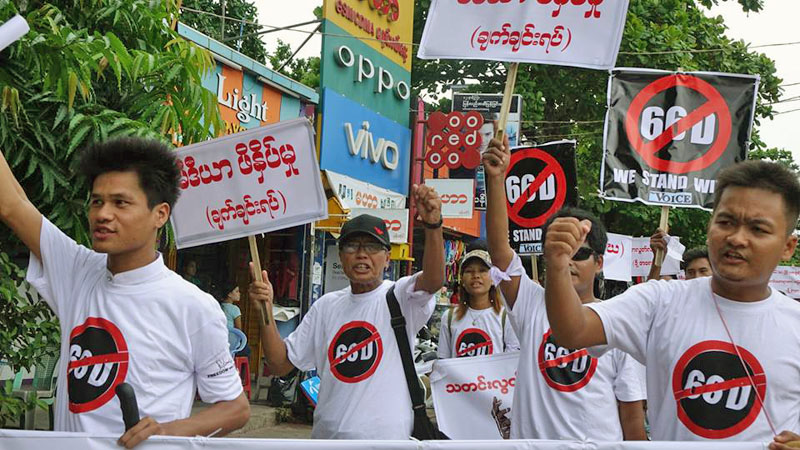Burma’s President Htin Kyaw on Tuesday authorised some amendments to the controversial Telecommunications Law, which has long been criticised by rights groups and activists who say that the government and military have used its vague terminology in order to silence dissent and crack down on the media.
The two main changes to the Act affect its punitive section, Article 66(d): the maximum sentence for those convicted is reduced from three years to two; and defendants will now be able to seek bail.
The amendments, which were passed in parliament on 18 August, include the removal of the clause “… coercing, restraining wrongfully, causing undue influence”, meaning legal action will no longer be taken unless aggrieved persons sue directly. The clause relates to cases of “online defamation”, procedures that have increasingly taken courts’ time in recent years. Earlier this week, a freelance journalist from Mandalay was arrested under this statute after criticising a government minister on Facebook.
For many civil rights activists who had called for parliament to repeal the Telecommunications Act, lawmakers have failed to tackle the issue.
“There are only two apparent changes: the fact that a third party cannot now file a lawsuit; and a reduction in the maximum sentence,” said Maung Saungkha, an activist leading the Telecommunications Law Research Group.
“The act of ‘defaming’ is not clearly defined; it is a very broad term,” he added. “The difference between the defamation section under the penal code and the clause in the Telecommunications Act is that the latter allows the authorities to detain a person as soon as a lawsuit has been filed.”
[related]
Asked about recent cases dealing with the alleged dissemination of false information and threats to journalists, Zeya Hlaing, a member of Myanmar Press Council, said, “Photos of journalists are being posted online, and they are subsequently being threatened. This is more [serious] than ‘defamation’.”
According to the Rangoon-based Telecommunications Law Research Group, no less than 96 lawsuits had been filed under Article 66 (d) by 20 August, and at least 20 journalists have been sued.
WATCH: DVB Debate– Should MPs amend or repeal the telecoms law’s section 66(d)?



